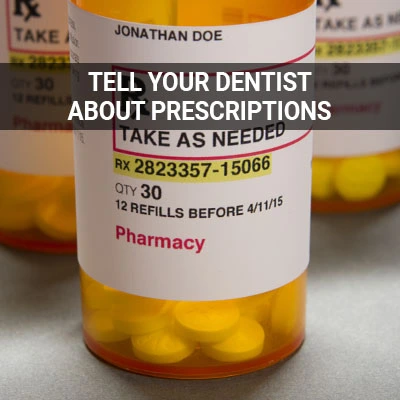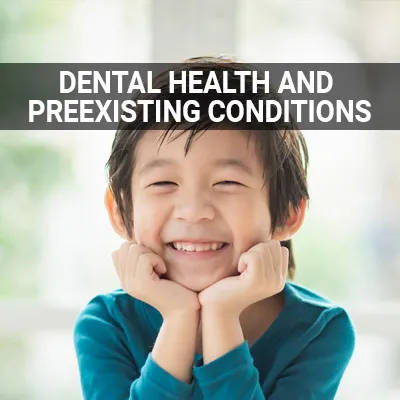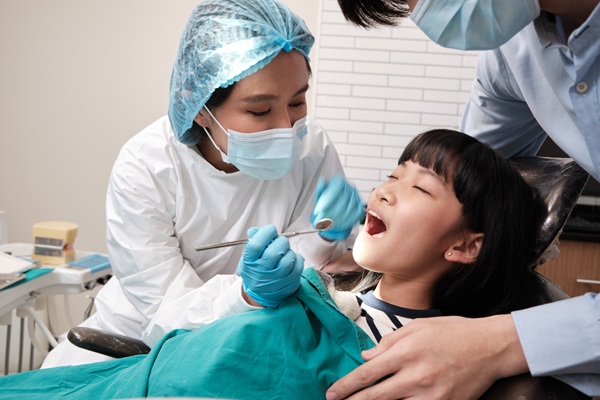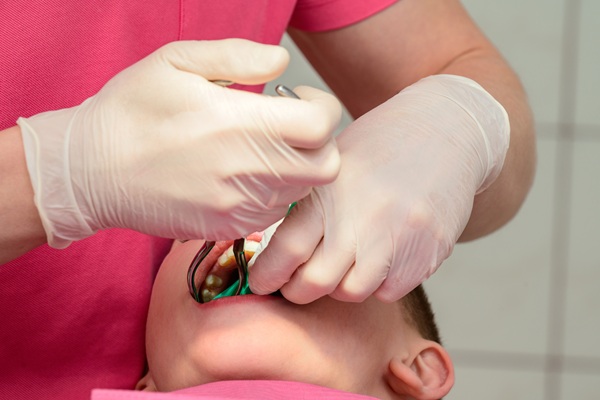Medications That Affect Oral Health Northridge, CA
It is important to consider the oral-systemic link and understand how medications you are taking can affect your oral health. When deciding whether or not to perform a procedure or prescribe medication, we take a couple of things into account. Though it is easy to think of the mouth as an isolated ecosystem, the medications you take to help regulate other body systems can play a role in your oral health.
To better understand this connection, our team at Kidz Dental Home in Northridge is here to help. Call us at (818) 477-4083 to learn more about our services or schedule an appointment.
We Welcome Medi-Cal (Dental)
Cancer Medications
Certain medications used as a part of cancer treatment could affect a patient's oral health. Many cancer medications, including chemotherapy, are notorious for causing symptoms such as dry mouth (xerostomia), mucositis (sores), and taste changes. A dry mouth, in particular, is an environment that is more vulnerable to the overgrowth of bacteria, which cause tooth decay, infections, or gum disease.
This is why a dentist needs to know if a patient is receiving cancer medicine. Patients who are experiencing oral side effects from cancer medications should inform their doctor and dentist. We may be able to help by prescribing a saliva substitute.
“Dry mouth, in particular, is an environment that is more vulnerable to the overgrowth of bacteria, which cause tooth decay, infections, or gum disease.”
Behavior or Mood-Altering Drugs
Psychoactive medications refer to drugs that change the brain's function and alters a person's perception, mood, cognition, consciousness, or behavior. These medications include, but are not limited to, antidepressants, anti-anxiety, stimulants, antipsychotics, and mood stabilizers. Behavior and mood-altering drugs can cause dry mouth syndrome and increase the risk of tooth deterioration.
Dry mouth syndrome leads to tooth decay, tooth loss, and gum disease because of reduced saliva production. According to Better Health, lack of sufficient saliva production inhibits saliva from:
- Reducing the population of bacteria in the mouth
- Neutralizing mouth acids that cause tooth decay
- Re-mineralizing, which repairs tooth enamel (the hard surface layer that protects the tooth) that has been damaged by acids
- Clearing food particles from the teeth and gums
“Behavior and mood-altering drugs can cause dry mouth syndrome and increase the risk of tooth deterioration.”
Medication for Diabetes
Diabetes can affect any area of the body, including the mouth. In both types of diabetes, Type I and Type II, elevated blood sugar can cause mouth symptoms such as dry mouth, taste changes, delayed wound healing, and increased inflammation and bleeding.
However, once a patient begins taking medication for diabetes, such as metformin or insulin, they may notice a positive impact on their oral health. When blood sugar is well-controlled with diabetes medications and a patient receives regular dental care, they can reduce the risk of developing oral conditions such as periodontal disease.
“In both types of diabetes, Type I and Type II, elevated blood sugar can cause mouth symptoms such as dry mouth, taste changes, delayed wound healing, and increased inflammation and bleeding.”
Check out what others are saying about our dental services on Yelp: Medications That Affect Oral Health in Northridge, CA
Regulatory Medications
Many other prescription medications that regulate chronic medical conditions can also impact patients' oral health.
Here are just a few examples:
- Cardiovascular medications: Medications such as calcium channel blockers can cause a condition known as gingival hyperplasia, or gingival enlargement, which can contribute to the development of gum disease.
- Seizure medications: One of the most notorious side effects of the seizure medication known as phenytoin (Dilantin) is also gingival hyperplasia.
- Thyroid medications: Because they can alter the production of thyroid hormones, thyroid medications can cause many changes to a patient’s oral health, including changes in saliva production, tongue size, and gum tissue.
- Osteoporosis medications: The bisphosphonate medication class, which treats osteoporosis, can cause a serious condition known as osteonecrosis of the jaw.
- Anticoagulant or antiplatelet medications: Medications that thin the blood, such as warfarin or clopidogrel, can cause bleeding of the gums, particularly when flossing.
Our team is skilled in performing a complete assessment of patients' oral health, taking into account the role that prescription medications play in the symptoms they are experiencing.
“Medications that are used to thin the blood, such as warfarin or clopidogrel, can cause bleeding of the gums, particularly when flossing.”
Questions Answered on This Page
Q. How can psychoactive medications result in tooth loss?
Q. How can I maintain good oral health while taking medication?
Q. How do cancer medications affect oral health?
Q. How does medication for diabetes impact oral hygiene?
Q. How do regulatory medications affect oral health?
People Also Ask
Q. How do preexisting conditions affect dental care?
Q. Why is preventative care important? How can it save you money?
Q. What pre-existing conditions are affected by dental health?
Q. What family members may need extra help with their oral hygiene?
Keeping Mouth Healthy While on Medication
It is important to know and understand the side effects resulting from a particular medication and how to reduce or eliminate them in an effort to maintain good oral health. Taking appropriate hygienic measures also decreases many general health symptoms as much of the bacteria in the mouth is cleared before entering the body.
Depending on the health condition, complete health dentists can offer insights on how to relieve dry mouth, enlarged gums, abnormal bleeding, taste changes, tissue reactions, bone loss, discoloration, and thrush infection. In most cases, patients cannot decide against taking medications, but dentists may lower their dosage or alter the medication to suit their oral needs. Patients should seek medical and dental advice regarding medications while also maintaining a proper oral hygiene regimen.
“In most cases, patients cannot decide against taking medications, but dentists may lower their dosage or alter the medication to suit their oral needs.”
Frequently Asked Questions About Medications Linked to Dental Health
Q. What can I do to improve my oral health while taking psychotropic medications?
A. Once you are aware of the connection between your medications and your oral health, you can make changes to your routine that can positively impact your dental condition. According to the Oral Health Foundation, changes as simple as reducing your sugar intake, and brushing with fluoride toothpaste, can help mitigate the impact of your medications.
Q. What kinds of heart medications can cause changes in my gum tissue?
A. The most common cardiovascular medication that contributes to gum changes is known as a calcium channel blocker. Examples of calcium channel blockers include verapamil, amlodipine, and nifedipine. If you are noticing changes in your gums from a medication, your dentist may be able to discuss an alternative medication with your physician.
Q. What types of medications affect oral health?
A. Many different types of medications affect the oral cavity. It also largely depends on the form and dosage. Among them are antihistamines, decongestants, painkillers, high blood pressure medications, muscle relaxants, drugs for urinary incontinence, Parkinson's disease medications, and antidepressants.
Q. What can my dentist do if I am taking a medicine that affects my oral health?
A. Your total health dentist considers your oral-systemic connection when conducting assessments of your oral health. If you are taking a medicine that impacts your oral health, your dentist may be the first clinician to identify this. If we do so, we will work with your prescribing physician to make changes or adjustments as needed. We can also consider medications, such as saliva substitutes to help with symptoms.
Q. Does the dentist work with primary care doctors to alter medications?
A. Patients who require treatment may need to alter their medications in order to undergo the procedure. We can communicate with your doctor to suggest certain medications that are safer or measures to take until you recover from the procedure. We can also work with you on questions to ask your doctor about oral medications.
Dental Terminology
Learn More Today
If you are interested in better understanding complete health dentistry and effects of medication, call us at 818-477-4083 to set up an appointment.
Helpful Related Links
- American Dental Association (ADA). Glossary of Dental Clinical Terms. 2025
About our business and website security
- Kidz Dental Home was established in 2024.
- We accept the following payment methods: American Express, Cash, Check, Discover, MasterCard, and Visa
- We serve patients from the following counties: Los Angeles County
- We serve patients from the following cities: Northridge, Los Angeles, Panorama City, Porter Ranch, Granada Hills, Reseda, Van Nuys, Sherman Oaks, North Hills, Mission Hills, Canoga Park, Winnetka, Chatsworth and Tarzana
- Norton Safe Web. View Details
- Trend Micro Site Safety Center. View Details
Back to top of Medications That Affect Oral Health










